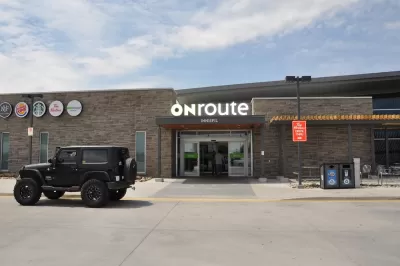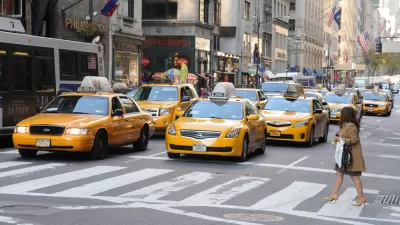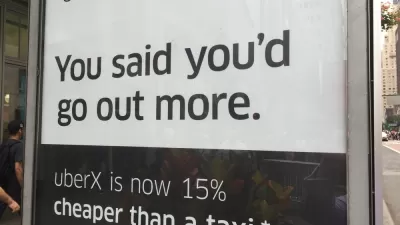The potential risks of privatizing mobility are scrutinized in a Canadian city that subsidizes Uber rides.

"Since last May, more than 25,000 trips have been taken with Uber in a town near Toronto, Ontario called Innisfil," reports Tracey Lindeman. "That number, provided to Motherboard by the town, is particularly significant because Innisfil only had around 36,000 residents in 2016."
The town of Innisfil is one of a few in North America that subsidizes ride-hailing trips—in this case to substitute for public transit. Other cities in British Columbia, where ride-hailing companies are illegal, are hoping to follow Innisfil's lead in subsidizing Uber and Lyft rides.
As Lindeman notes, however, "[h]aving a private technology company step in to provide essential services normally offered—and paid for—by governments is a potentially worrisome trend." The main concern Lindeman expresses is a concern that riders would be trapped in a number of scenarios, like the company suddenly goes out of business or raises prices dramatically.
Paul Pentikainen, Innisfil’s senior policy planner, is on the record in the article claiming that the service is cheaper for the city than paying for bus service, but Uber won't say whether the program is profitable for the company. That's not the only reason to approach the long-term sustainability of this program with skepticism. Lindeman rightly points out many of the possible ways programs like Innisfil's could go wrong for residents.
FULL STORY: Uber Says Small Town Public Transit Partnerships Are 'Critical' to Its Success

Planetizen Federal Action Tracker
A weekly monitor of how Trump’s orders and actions are impacting planners and planning in America.

Restaurant Patios Were a Pandemic Win — Why Were They so Hard to Keep?
Social distancing requirements and changes in travel patterns prompted cities to pilot new uses for street and sidewalk space. Then it got complicated.

Maui's Vacation Rental Debate Turns Ugly
Verbal attacks, misinformation campaigns and fistfights plague a high-stakes debate to convert thousands of vacation rentals into long-term housing.

In California Battle of Housing vs. Environment, Housing Just Won
A new state law significantly limits the power of CEQA, an environmental review law that served as a powerful tool for blocking new development.

Boulder Eliminates Parking Minimums Citywide
Officials estimate the cost of building a single underground parking space at up to $100,000.

Orange County, Florida Adopts Largest US “Sprawl Repair” Code
The ‘Orange Code’ seeks to rectify decades of sprawl-inducing, car-oriented development.
Urban Design for Planners 1: Software Tools
This six-course series explores essential urban design concepts using open source software and equips planners with the tools they need to participate fully in the urban design process.
Planning for Universal Design
Learn the tools for implementing Universal Design in planning regulations.
Heyer Gruel & Associates PA
JM Goldson LLC
Custer County Colorado
City of Camden Redevelopment Agency
City of Astoria
Transportation Research & Education Center (TREC) at Portland State University
Camden Redevelopment Agency
City of Claremont
Municipality of Princeton (NJ)





























